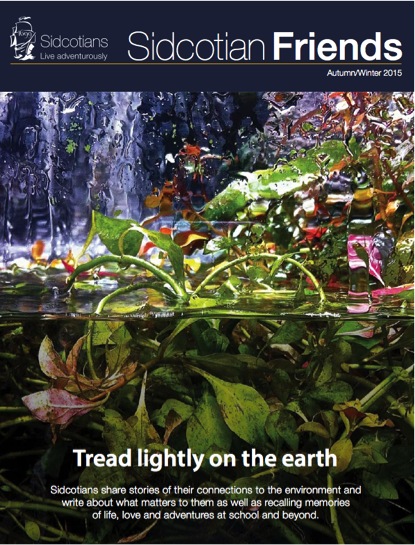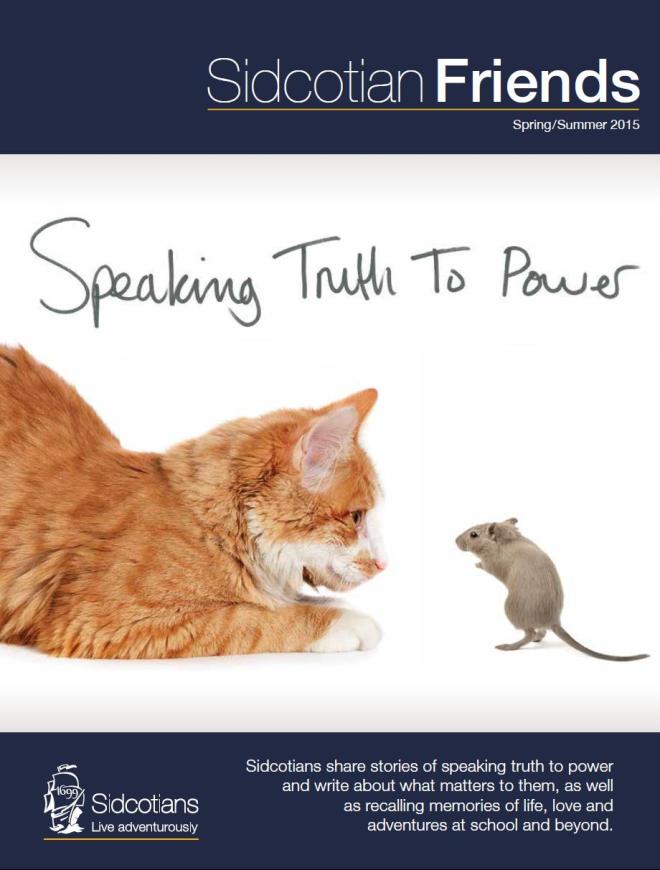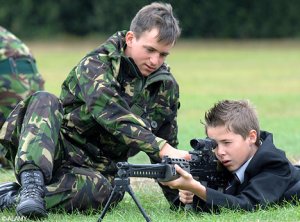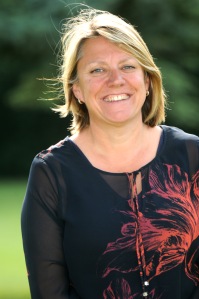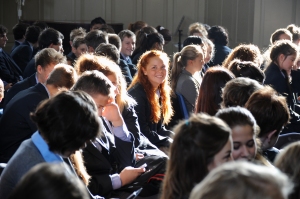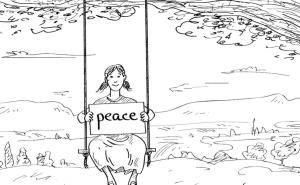Blast from the past! A Dymond speech from yesteryear
Those Little Things was a winning speech by Vincent (formerly known as Adam) Gaine who was a pupil at Sidcot 1991-1995). If you would like to share your past speeches, poems or short stories, please email alumni@sidcot.org.uk
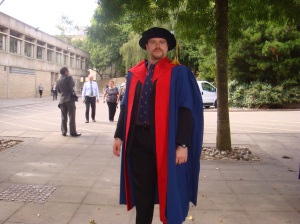
Vincent – life after Sidcot has seen him graduate from University and write a book!
This speech is called “Those Little Things”, so that’s what I’m going to talk about. There was rumour around, or so I heard, that the title of my speech actually had nothing to do with its contents, but that’s not true, I am going to talk about “Those Little Things”.
I thought I would start with a little song; it’s about my sex life.
(Pause)
That’s it! Just like my sex life in fact, non-existent!
Of course, sex could certainly be regarded as one of “those little things”, but there are others which I am probably more qualified to talk about, and I also have a terrible singing voice. So, for a number of good reasons, instead of a song, I’ll tell you a story.
Once upon a time, a boy was of about eleven or twelve was walking home from school when two bigger boys in his year came after him. One of them started to push him around and throw drink from his can over the smaller boy, and tuged at his coat and bag and tried to trip him up. But the other bigger boy pushed him off, telling the bully to stop.
As the smaller boy was crossing a common that was part of the walk home, the bully ran at him and shoved him hard. The smaller boy would have only staggered back, but the second bigger boy had crouched down behind him so his legs were swept out from under him and he fell flat on his back. The two bullies laughed loudly at this and strolled away, still laughing.
The smaller boy was not hurt by the fall, but what did hurt was the fact that the second bigger boy, who had helped him at first, had actually been setting him up for a more horrible attack. The smaller boy felt greatly upset because the second bigger boy had acted friendly, just for the purpose of hurting him more.
That small, frightened, victimised boy, whom we shall call Horace, was used to such occurrences, but just because being bullied was a regular part of his life didn’t make it any easier. Another day when he was actually at school, in a Humanities lesson, the class was doing an exercise on pocket money. At the time, Horace received sixty pence pocket money a week, because he didn’t really have a use for any more. He was content with sixty pence a week, but one of the stupider and nastier people in the class happened to look over his shoulder. Immediately, this boy started shouting about how Horace only received 60p, and within five minutes all of the pupils in the class were laughing at it. Some of them received a fiver every week, or more if they were going down town. They made a massive joke at Horace’s expense, making him out to be some kind of inferior being. Horace was terribly upset at being treated as nothing more than a toy.
There were other incidents, but I hope that what you’ve heard so far might shed a little light on how horrible human beings can be. And that kind of persecution can have very serious effects on the victim, and I should know. I imagine you all realise that that frightened, victimised boy whom we’ve called Horace, was actually called Adam Gaine; five years ago now, yet still as fresh in my mind as the days on which they happened
Those things happened at my first secondary school an inner city comprehensive in Bristol. Over the time that I was there, the bullying I received, and the almost total nonchalance of anyone who happened to notice it, made me lose most of my faith in human kind.
I came to believe that all people were either cruel or spiteful, or else didn’t care a jot for anyone. Subconsciously, I think, I followed that idea, and became aloof, independent and a complete loner. I cut myself off from everyone around me, while the victimisation continued.
My experiences with bullying at that school were so bad that my parents looked for another one, and found Sidcot. I came here in the autumn of 1991 and joined the Lower Fourth, aloof and independent as I said. I wanted nothing to do with anyone, and stayed in an icy shell of self-containment. I wanted to be left alone more than anything else. In fact, I was so aloof, and so cold, and even openly hostile to anyone who tried to penetrate my “shell”, that, had I regressed any further into my ideas of only being out for myself at all times, and caring nothing for anyone else, the only career that I would ever have been able to follow, for the rest of my life, would have been that of a politician!
OOOPHHH! I needed that! Did you need that too? Believe me, after getting all grim and serious, a joke is just what I needed to release the tension, and I hope you agree. . However, I think I might have overstepped the bounds of propriety; ooohh I’m in trouble now! Still, no regrets, it was well worth it.
Unfortunately for the Labour Party (I’m sure I would have been a hit) I didn’t regress any further. In fact, the shell started to melt and crack, partly due to continued weathering by the warm, supportive atmosphere of Sidcot, and also because of a small number of people who seemed to be always chipping away at the shell with friendliness. The chipping, cracking and weathering continued all through my first year, and finally I emerged.
There were some specific incidents during my time here when things got better, when I either felt more at ease or more confident with people. One example would be the camp at the end of the Lower Fourth I went on. On that camp, I was at the campsite where we stayed for a week, surrounded by school people. Nothing from home, and nothing I felt really comfortable with because everything around me was alien. But I had a great time, having to get on with other pupils proved to be not as awful a trial as I had feared. I joined in on a lot of activities, for example the water skiing. Hardly any of the people who tried that were able to stay on their skis once the boat got moving, and I was no exception. But, although what the activity mainly consisted of was getting thoughroughly wet and really looking rather silly, flailing about in the water, I don’t mind telling you (and I hope I’m not embarrassing anyone else here too much); despite all that, I still joined in, and enjoyed it. I often think that that camp was one of the significant points in my social development, and there were others as well. Two notable improvements in my ease around people and my confidence with life would be the two plays I have been involved in here at Sidcot. Last summer I took part in the production “A Dream of Old Somerset” a play that was good fun but I will say no more about (and that’s probably a good thing) and last autumn’s production : “The Crucible”. That was much better, and I felt great taking part in that.
So, as time went on, my social development continued. I became more and more confident around people, made good friends, and finally reached my peak in terms of confidence, prowess and ease with people here, in the Upper Fifth. This last year has been one of the best but, in my little life of sixteen years, the last four years have been the best. That frightened, shivering, victimised little boy is gone, and this towering pillar of magisterial wonder that stands before you now is what lives in his place.
Is it just me, or did that sound just a trifle big headed? I think it did; let’s try again and what you see before you now is what lives in his place (better, huh?).
Here I am, exams completed, quite a number of awards like Life Saving 1,2,3, Duke of Edinburgh Bronze Award, and LAMDA Grade Four Improvisation Award under my belt (and you thought this was a real paunch), many activities done, at ease with people, confident in life, and it’s all thanks to Sidcot’s warm and supportive atmosphere.
Hold it! Don’t applaud yet, I’m not finished. Fooled you there, didn’t I? So, what next, I hear you think (didn’t know I was telepathic, did you?)?
That’s the 64p question (64p plus the rest of my life, I guess life is cheap). Sadly, what happens next is a melancholy thing, but one that must be told. I wanted to do this speech to create a highlight in my time here at Sidcot, but when I was writing it I realised that I want it to be THE highlight of my career; this is how I want to be remembered and this is my farewell. So, of course, that means I am leaving. As I said, best four years of my life, but now they are at an end. The reason? Well that is, literally, the big money question, because that is the problem. I would love, above all other things, to stay here for the Sixth Form, but it is impossible, because of money:. My parents cannot afford to keep me here. I do not blame the school for this, I’m sure they know a lot more about financing than I do. Nor do I blame the Government, though if I could think of a reason I probably would. It is simply bad luck, and so could only be cured by great good luck, like winning the Lottery (who says money isn’t everything?) .
If I was careless, I could easily lose you now by getting gushy and overly sentimental, and you’d probably start to feel queasy. I hope that won’t happen. I don’t want to make anyone sick (although, if I did, it would add new meaning to the phrase “Reveal what is .within”) but if l do make anyone ill, just let me know and I’ll pause to allow them to leave.
At first, I was crushed when I learned that there was no chance of staying here, but, painfully and with some degree of difficulty, I have come to accept the fact that my time at Sidcot, like all good things, has come to an end. I am still disappointed and upset about it, but something positive has come out of this well of misery (Oh err, this is a good opportunity for a cliché lover): I am not the only one who is sad about my departure, and that reveals something to me. Although, in the four years I’ve been here, I have emerged from my shell and made friends and formed good relationships, I have still been cautious of people, not wanting to put too much faith in them. But recently, many people have been telling me that they will be sad to see me go and that they will miss me, and even that, if they could, they would help me to stay (so if they won the Lottery, they would help to pay for me to stay, and I’m not joking about that, some people have actually said that to me). That means something. It means that I now know that my old ideas about all humans beings being out only for themselves and not caring about anything else is definitely not true; the habits of politicians are the exception, not the rule. Some people can be depended on, once they get a chance to show it. There are a few people in here that I feel a strong and special bond with, but I would not embarrass them by calling out their commonly used names, so I’ll use “code” names for them: Gwendoline, Victoria, Joy, Mervyn, Alistair and Jeanette, thank you. Those names won’t mean anything to most of you, but they are a special and private message to those special people. But, as well as that strong, personal bond, I also feel a bond with all of the people, students and staff, at Sidcot School who contribute to the warmth and security of its atmosphere.
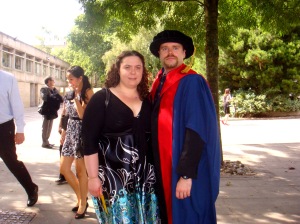
Vincent pictured with his wife Amanda

